5 Regrets: Looking Back While Forging Ahead
A MiddleWeb Blog
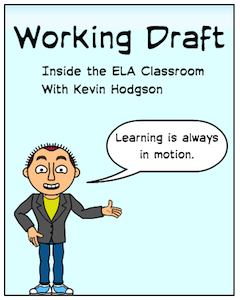
And we’ve still got plenty to do in my sixth grade classroom – from wrapping up a digital picture book project (which will become a published book in their hands) to writing an argumentative essay (on the topic of cell phones in schools) to curating their own writing and projects in a digital portfolio.
Don’t ask me how. We’ll get it done.
I know those of us in schools spend time celebrating all that we have accomplished during the school year, as we should. Yet I find myself also wondering in these late days about all the things I wished I had done, or that I had done better, or maybe that I had never even attempted to do.
Regrets? Yep. I have a few.
So, here is my list of Five Regrets, along with ideas for moving forward next year ….
1. I wish I’d had more patience. I know, to the outside world, I seem awfully patient. Calm and collected. But there were times when I looked at my curriculum, which I have written myself (a luxury these days), and thought: why are we not farther along? I know some days I was short with students asking questions that I just had answered. Why weren’t they listening? That student who wants to use the bathroom? Can’t they wait until I am done with directions? Bottle flipping …. fidget spinners … slime. Enough!
Or I found myself impatient with the larger world around me, grappling with the decisions of others that impacted my teaching and my students. I’m not all that convinced on the push into “mindfulness” (although I remain open to the concept), but perhaps I need to find more strategies to fight against impatience with the world. Slowing down might help. I’ll work on it. Further reading for myself: Mindfulness.
2. I had hoped to do more Connected Learning projects. I don’t know why we didn’t, given how much I write and advocate for extending the walls of my classrooms through global activities and Skype sessions with experts. It seems like I used to do more of it, and this year, we did not do nearly enough.
I’m going to search for an engaging project for next year to hook my students into the world beyond their small suburban town. We’re going to use our technology and writing to expand the notions of being a citizen of the world. Maybe I’ll finally step into the Genius Hour project, long a goal of mine but not yet a reality. Further reading for myself: Educator Innovator.
3. I know we need more text sets, reading across multiple genres on common topics. I’ve made some steady progress with this, but not nearly enough. And I’m exasperated with myself when I realize that much of my teaching about reading across multiple texts and genres only comes into view when we approach our state testing season. That’s when I realize that I have not done enough to prepare my students.
What I really should be thinking is, how can I do this all year to enrich my literacy instruction. How can I use historical documents and oral history elements to provide additional paths into texts? Not, will this be on the test? More, this will inform and interest you and give you more context for your reading. My goal is to expand out my secondary texts in the next year, one novel at a time. I can do this. Further reading for myself: Library of Congress Digital Archives.
4. I wish I had spent even more time learning the stories of my students — their lives outside of school. This was one of those years where I had a cluster of students who didn’t seem to open up as much as usual, and I wonder if it is because I didn’t find the right way to make that happen.
I want to know my students beyond the school, for it is in those moments that they become more than just students. They become human beings with hurts and passions and dreams and more. Every teacher needs to find ways to know the student as a full person. I’ll be looking for activities and prompts that will provide more possible inroads. Further reading for myself: Icebreakers.
5. We need more hands-on, maker-oriented activities connected to writing. I love to write, and I love teaching writing. Yet many students would benefit more if they could come to writing from another angle, perhaps with more interest and passion – doing more hands-on activities first (or maybe last, or both).
I’ve struggled with this for a few years now, trying to figure out how the Maker/Space concept might be something to tap into. We just learned we are getting a 3D printer, so maybe that will open up some possibilities. I feel like I need to engage my struggling writers more, and this direction of working with our hands to create things of substance might be one more strategy in the toolbox for how writers interpret the world. Further reading for myself: 3D Printers and Schools.
How about you? Any regrets this year? Have those regrets opened up doors to goals or aspirations? I’d love to hear from you this summer. See you in the comment bin!
Images: Kevin Hodgson/Creative Commons using Pablo by Buffer.

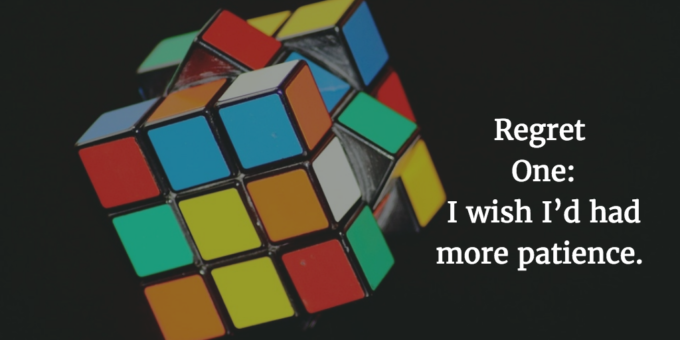
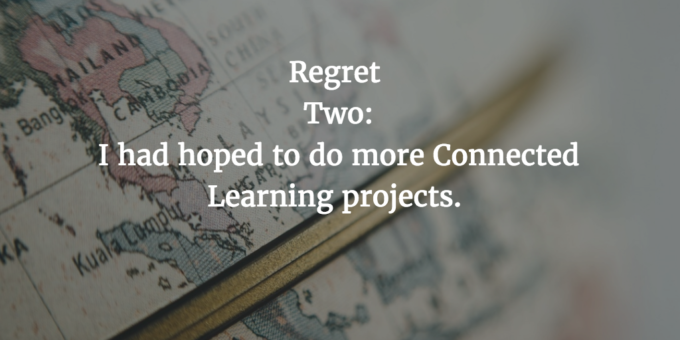
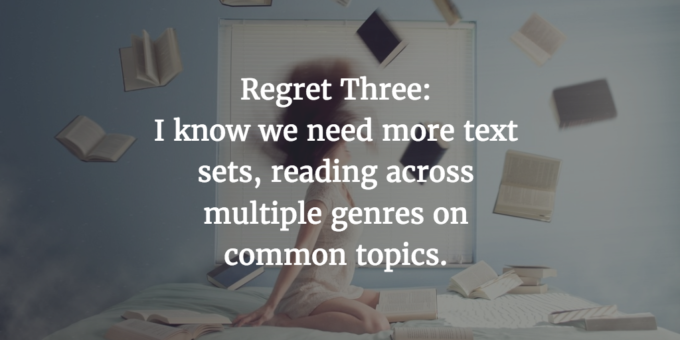
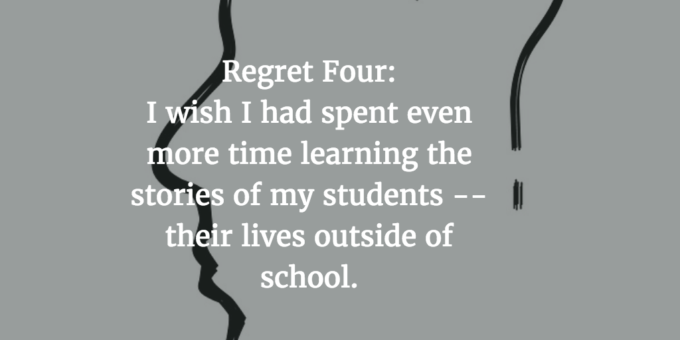
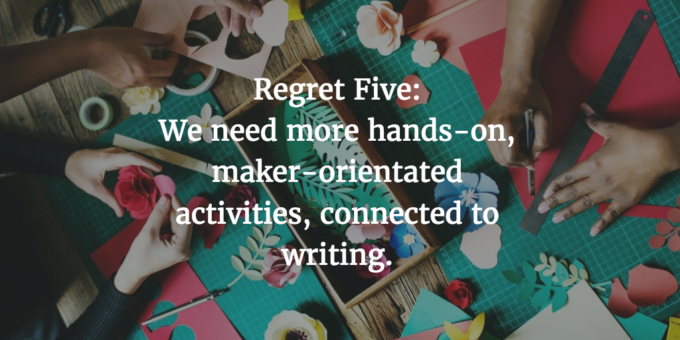


































Kevin,
I wanted to share my feelings about your heartfelt, insightful, and yes, mindful blog post. I just retired from teaching 6th graders in MA, and like you am a part of the National Writing Project. The fact that you are asking these questions of yourself demonstrates the outstanding teacher you are, and how grateful those kids are to have you.
#4 spoke to me the most; it’s something that took me a long time to figure out (I taught for 36 years and it wasn’t until I became a member of the original Middle Web (shout out to John Norton!) that other teachers helped me to do this. I sought out like minded teachers and asked how to achieve this. I read books, lots of them (Louanne Johsnon, the author who wrote My Posse Don’t do Homework which became the movie, Dangerous Minds, helped me create a classroom that put students first and gave me the opportunity to let the kids have a huge say in how I could help them, reach them, and most importantly enjoy being a student.
I would conference 1:1 on the phone before school started each summer and again during the first week of school and throughout the year to talk with my students. I always, always began with my own struggles and heartache so the kids knew even adults have pain in their lives. I created a lot of lessons that probably aren’t in the CCCS, but made a difference (Letting Our True Selves Shine was my twist on Louanne’s idea of having kids share a talent with their classmates and write about it. I learned how to paint flowers, make cookies without baking, kick a soccer ball and make Brigadeeros, a Brazilain dessert.
I know you will spend the summer (with all those snow days I can relate to ending the school year right before the July 4th holiday!) figuring this out.
But, please know you have a friend “just off the Mass Pike”
Thank you, Laurie. You comment has a lot of great ideas and the underlying theme of creating “a classroom that put students first and gave me the opportunity to let the kids have a huge say in how I could help them, reach them, and most importantly enjoy being a student” rings true for me, too. The sharing a talent connects nicely to the Genius Hour concept, too. Letting students shine with their own areas of expertise.
Thanks again
Kevin
PS — I also appreciate the Mass Pike/NWP connection!
Thank you for these wonderful and useful reflections on your year, my list would be very similar indeed.
As it is for you and Ms. Wasserman, that socio-emotional #4 is crucially relevant in my teaching approach. Each year I, too, wish I had been stronger in that regard.
There is one technique I either borrowed or developed (I cannot remember which) that has offered tremendous insights into students’ lives and that is low-impact in regard to demands on time and energy.
At different intervals, students enter the room to find a sheet of blank lined paper waiting for them. I propose only one question: “Is there anything you wish I knew about you that I probably do not ?”
It is a low-pressure exercise. Students know they may share as little or as much data, as personal or as pedestrian as is comfortable for them. In many cases, they are very willing to share experiences they are navigating. Often, they seem relieved to be asked.
For students who are either more guarded or for whom life is moving swimmingly along, the option of sharing a joke or a piece of benign data is also really welcomed. For example, a very upbeat student once wrote “I am very good-looking,” and it became a running gag between us.
Conversely, I frequently learn about divorces, family businesses failing, eating disorders emerging, past attempted suicides, hopelessness, harassment between students, etc.
After reviewing their responses, I am able to quietly watch over those who are privately struggling and/or make myself available to them. It just keeps them on my radar and, if circumstances warrant, results in the counselor’s intercession.
I love reading about how colleagues worldwide manage this aspect, and others, of student learning and well-being. Thank you again for such a thoughtful post.
Hi Kelly
The “blank sheet” is a great idea, and simple, too. But it provides a space for students to share with some privacy, and is another venue for written expression.
Sincerely,
Kevin